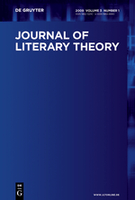
Journal of Literary Theory
Scope & Guideline
Fostering Interdisciplinary Dialogues in Literature
Introduction
Aims and Scopes
- Literary Autonomy and Ethics:
The journal investigates the concept of literary autonomy, exploring the boundaries between literary art and ethical considerations. This includes examining how literature functions independently while also reflecting social values. - Interdisciplinary Approaches:
A significant focus is placed on interdisciplinary methodologies, incorporating insights from sociology, philosophy, and cultural studies to enrich literary analysis. - Theoretical Frameworks and Models:
The journal emphasizes the development and application of theoretical frameworks, such as Bourdieu's field theory and rhizomatic networks, to understand literary texts and their contexts. - Digital and Audiovisual Literature:
With the rise of digital media, the journal explores the impact of technology on literature, including the study of audiobooks and digital mediators, and how these forms alter literary reception. - Memory and Migration Studies:
The journal examines themes of memory, migration, and identity in literature, focusing on how narratives shape and are shaped by cultural and historical contexts. - Collaborative Authorship and Collective Works:
It looks into the dynamics of collaboration in literature, investigating how shared authorship and collective works influence literary production and reception.
Trending and Emerging
- Audiovisual Literature and Reception Studies:
The exploration of how literature is experienced through auditory and digital mediums is on the rise, reflecting broader changes in media consumption and the relevance of sound in literary theory. - Environmental and Anthropocentric Perspectives:
There is an increasing focus on the Anthropocene and its implications for literature, investigating how literary texts engage with ecological concerns and the representation of the natural world. - Network Analysis in Literature:
The application of network analysis to literary studies is emerging as a significant trend, allowing scholars to rethink concepts of agency, collaboration, and creativity within literary texts. - Memory Studies in Literature:
The intersection of memory and literature is gaining prominence, particularly in relation to migration narratives and transgenerational memory, highlighting the role of literature in shaping collective and individual identities. - Collaborative and Collective Authorship:
An increasing number of studies are examining the implications of collaborative authorship in literature, reflecting contemporary practices that challenge traditional notions of individual authorship.
Declining or Waning
- Traditional Literary Criticism:
There is a noticeable decrease in papers focusing solely on traditional literary criticism, as the field increasingly embraces interdisciplinary and innovative approaches. - Narrow Genre Studies:
Studies that focus on narrowly defined genres are becoming less common, as scholars are shifting towards broader thematic explorations that encompass multiple genres and forms. - Historical Literary Contexts:
While historical perspectives remain important, the emphasis on purely historical literary contexts is waning in favor of contemporary issues and theoretical innovations.
Similar Journals

Valenciana
Advancing interdisciplinary dialogue in humanities and social sciences.Valenciana is an esteemed, peer-reviewed journal published by the University of Guanajuato, dedicated to advancing scholarly discourse in the fields of humanities and social sciences. Since its inception in 2008, this Open Access journal has facilitated unrestricted access to high-quality research, fostering collaboration and innovation among researchers, professionals, and students. With an ISSN of 2007-2538 and an E-ISSN of 2448-7295, Valenciana is committed to publishing original research, reviews, and theoretical contributions that illuminate contemporary issues and cultural phenomena. The journal not only serves as a platform for emerging voices in academia but also enhances its visibility in the global research landscape, driving interdisciplinary dialogue and engagement. Situated in Guanajuato, Mexico, Valenciana embraces the rich academic heritage of the region while also appealing to a broader audience, making it a vital resource for those seeking to explore new ideas and perspectives in their respective fields.

Interdisciplinary Studies of Literature
Fostering Innovative Connections in Literary StudiesInterdisciplinary Studies of Literature is a premier academic journal dedicated to advancing the field of literature and literary theory, published by KNOWLEDGE HUB PUBL CO LTD in China. Since its inception in 2017, this journal has consistently offered a vibrant platform for scholarly discourse, hailing from a prestigious Q1 ranking in the Literature and Literary Theory category, reflecting its commitment to high-quality research. With a Scopus rank of #455 out of 1106 in the Arts and Humanities category and a standing in the 58th percentile, this journal embraces diversity in literary studies while fostering interdisciplinary connections to critical theories and practices. Academics, researchers, and students alike will find valuable insights and innovative perspectives within its pages, making it an essential resource for those engaged in literary analysis and theory. Engaging with this journal not only enriches understanding but also promotes the evolution of literary discourse globally.

Teksty Drugie
Exploring the Depths of Literary TheoryTeksty Drugie is a premier academic journal dedicated to the field of Literature and Literary Theory, published by the Polish Academy of Sciences, Institute of Literary Research. With its issuance beginning in 2008 and extending intermittently to 2020, this journal has been a significant contributor to literary scholarship in Poland and beyond. The journal holds a commendable Q2 ranking in its category for 2023, indicating its influential status amongst peers in the Arts and Humanities realm, and an impressive Scopus rank of #736 out of 934 in the Literature and Literary Theory domain, with a 21st percentile ranking. Researchers and students will find this journal invaluable for its rigorous academic standards and insightful contributions to contemporary literary discourse. While traditionally available through subscription, Teksty Drugie remains an essential resource for those engaged in the study of literature, offering critical theoretical perspectives and a forum for scholarly debate. The journal is located at ul. Nowy Świat 72, Pałac Staszica, Room 1, Warszawa 00-330, Poland.
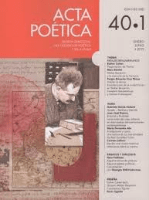
Acta Poetica
Exploring the Depths of Literary DiscourseActa Poetica is a distinguished open-access journal dedicated to advancing research and scholarship in the fields of Cultural Studies and Literature and Literary Theory. Published by the Universidad Nacional Autónoma de México through its Instituto de Investigaciones Filológicas, this journal has been a pivotal platform for the dissemination of literary discourse since it embraced open access in 1979. With a notable presence in both the social sciences and humanities, Acta Poetica has earned a ranking of Q3 and Q2 in the 2023 category quartiles, reflecting its commitment to quality scholarship. The journal invites contributions from researchers, professionals, and students alike, fostering a rich dialogue that explores the nuances of literary criticism and cultural phenomena. With its ISSN 0185-3082 and E-ISSN 2448-735X, the journal aims to make valuable research accessible to a global audience, continuing its legacy of enhancing literary scholarship from its base in Mexico City.
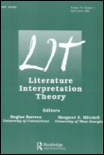
LIT-Literature Interpretation Theory
Transforming Literary Discourse Through Innovative Analysis.LIT-Literature Interpretation Theory is a premier academic journal that delves into the intricate relationships between literature and various interpretative theories, published by Routledge Journals, Taylor & Francis Ltd. With an ISSN of 1043-6928 and E-ISSN 1545-5866, this journal has established a notable reputation within the field, evidenced by its ranking in the 71st percentile among peers, and its placement in Q3 of the Literature and Literary Theory category for 2023. Since its inception in 1989 and continuing through 2024, LIT has aimed to provide a platform for the examination of literary texts through diverse theoretical lenses, catering not only to scholars and researchers but also to students and practitioners interested in literary discourse. Although it does not offer open access, the journal continues to be a vital resource for those seeking to enhance their understanding of literary theory within the arts and humanities. With robust insights and critical analyses, LIT contributes significantly to ongoing conversations in literature and promotes innovative interpretations that challenge conventional perspectives.

Ermeneutica Letteraria-Rivista Internazionale
Advancing Critical Perspectives on Literature and LinguisticsErmeneutica Letteraria-Rivista Internazionale, published by FABRIZIO SERRA EDITORE, serves as a notable platform for the ongoing discourse in the fields of Arts and Humanities, Linguistics, Literature, and Literary Theory. Since its inception in 2019, this scholarly journal has become a significant reference point for innovative research while critically engaging with various literary paradigms and linguistic phenomena. Although currently classified in the Q4 quartile across its respective categories by Scopus, its commitment to open discourse invites submissions that challenge existing norms and broaden the horizons of contemporary literary critique. The journal's holistic approach not only supports the scholarly community in Italy but also aims to foster international dialogue among researchers, professionals, and students in the humanities. The journal is located in Pisa, Italy, and due to its open access policy, it seeks to ensure that knowledge is accessible to a wider audience while contributing to the collective understanding of literary interpretations and linguistic developments.
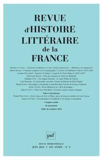
REVUE D HISTOIRE LITTERAIRE DE LA FRANCE
Exploring the Depths of French Literary HeritageREVUE D'HISTOIRE LITTERAIRE DE LA FRANCE, published by Classiques Garnier, is a distinguished academic journal dedicated to the exploration and analysis of French literary history and theory. With an ISSN of 0035-2411 and an E-ISSN of 2105-2689, this journal serves as an essential resource for researchers, professionals, and students in the fields of literature and the humanities. Though it does not currently offer open access, its rigorous scholarship contributes significantly to the understanding of historical literary movements and their cultural contexts. Despite its discontinuation in Scopus after 2016, the journal has a notable academic pedigree, providing critical perspectives on literature from the past to the contemporary era. Situated at 6 Rue de la Sorbonne, Paris 75005, France, the journal aims to enrich the discourse surrounding literary theory and history, highlighting its enduring relevance in today's scholarly landscape.

JOURNAL OF MODERN LITERATURE
Engaging with the Pulse of Today's Literary LandscapeJOURNAL OF MODERN LITERATURE, published by Indiana University Press, is a distinguished peer-reviewed journal that delves into critical examinations of modern literary texts and theories. Since its inception, the journal has served as a vital platform for scholars dedicated to the exploration of contemporary literature, making significant contributions to the discourse within the field. With an impressive ranking of Q2 in the Literature and Literary Theory category as of 2023, it positions itself among the top-tier journals in its domain, reflecting its strong impact within academic circles. This journal not only fosters scholarly dialogue but also embraces innovative approaches to literary criticism, ensuring relevance in today’s dynamic cultural landscape. Researchers, professionals, and students will find a rich repository of articles that engage with various modern literary paradigms, enhancing their understanding and appreciation of the intricate relationships between literature and broader socio-cultural contexts. Though it does not operate under an open access model, the journal's extensive reach through its digital ISSN (1529-1464) and print ISSN (0022-281X) allows for valuable insights to be disseminated to the appropriate audiences.
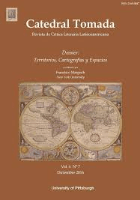
Catedral Tomada-Revista de Critica Literaria Latinoamericana-Journal of Latin American Literary Criticism
Unveiling the Rich Tapestry of Latin American VoicesCatedral Tomada - Revista de Crítica Literaria Latinoamericana is a pioneering journal dedicated to the exploration and critique of Latin American literature and its broader cultural implications. Published by the University of Pittsburgh's Library System, this Open Access journal has been instrumental since its launch in 2013 in making scholarly discussions accessible to a wider audience. With an ISSN of 2169-0847, the journal serves as a vital platform for researchers, professionals, and students interested in Literature and Literary Theory, Cultural Studies, and Linguistics and Language. Its esteemed ranking places it in Quartile 1 for Literature and Literary Theory and Quartile 2 for the other categories, underlining its commitment to high-quality academic discourse. Converging insights through a quarterly publication schedule from 2019 to 2024, Catedral Tomada aims to foster a rich dialogue on Latin American literary criticism, encouraging innovative perspectives and diverse voices within the field.

STRUMENTI CRITICI
Fostering Scholarly Dialogue in Literary TheorySTRUMENTI CRITICI, an esteemed journal within the realm of literature and literary theory, is published by SOC ED IL MULINO in Italy. With its ISSN 0039-2618, this journal serves as a platform for scholars to disseminate their research findings and engage in critical discussions. Despite being ranked in the Q4 quartile for the category of literature and literary theory, its unique contributions, spanning from 2002 to 2024, resonate strongly within the academic community. With a current Scopus rank of #937 out of 1106, placing it in the 15th percentile, STRUMENTI CRITICI continues to explore innovative perspectives on literary studies and theory, making it an essential resource for researchers, professionals, and students alike. Although not an open-access journal, it maintains a rigorous selection process to ensure the quality and relevance of published works, fostering scholarly dialogue and advancing the field.